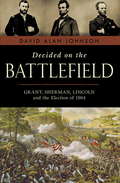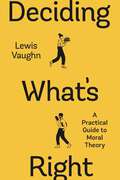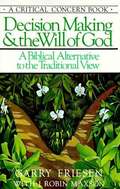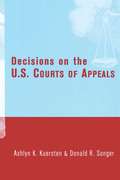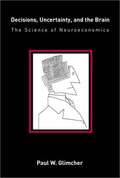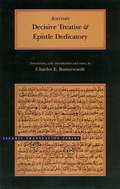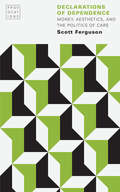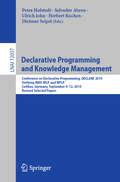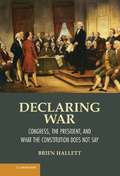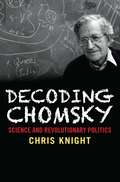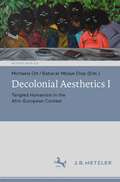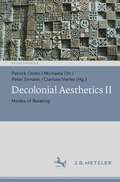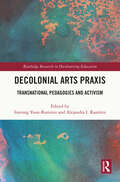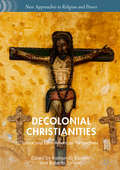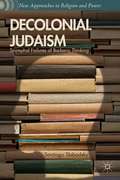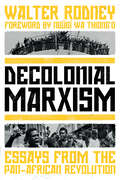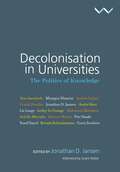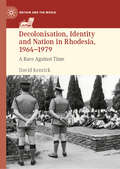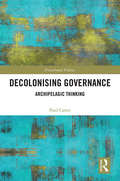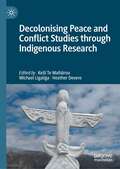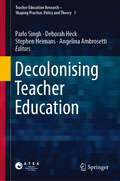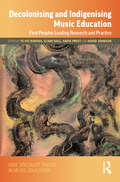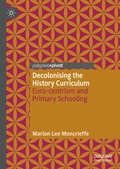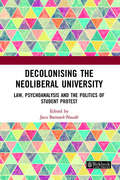- Table View
- List View
Decided on the Battlefield: Grant, Sherman, Lincoln and the Election of 1864
by David Alan JohnsonThis lively narrative, full of intriguing historical facts, brings to life an important series of episodes in our nation's history. History and Civil War buffs will not want to put down this real-life page-turner."I'm going to be beaten . . . and unless some great change takes place, badly beaten." President Abraham Lincoln,August 1864 In the summer of 1864, Abraham Lincoln made this gloomy prediction about the outcome of the upcoming presidential election. The American Civil War had dragged on for over three years with no end in sight. Things had not gone well for the Union, and the public blamed the president for the stalemate against the Confederacy and for the appalling numbers of killed and wounded. Lincoln was thoroughly convinced that without a favorable change in the trajectory of the war he would have no chance of winning a second term against former Union general George B. McClellan, whom he had previously dismissed as commander of the Army of the Potomac. This vivid, engrossing account of a critical year in American history examines the events of 1864, when the course of American history might have taken a radically different direction. It's no exaggeration to say that if McClellan had won the election, everything would have been different--McClellan and the Democrats planned to end the war immediately, grant the South its independence, and let the Confederacy keep its slaves. What were the crucial factors that in the end swung public sentiment in favor of Lincoln? Johnson focuses on the battlefield campaigns of Generals Ulysses S. Grant and William Tecumseh Sherman. While Grant was waging a war of attrition with superior manpower against the quick and elusive rebel forces under General Robert E. Lee, Sherman was fighting a protracted battle in Georgia against Confederate general Joseph E. Johnston. But then the president of the Confederacy, Jefferson Davis, made a tactical error that would change the whole course of the war.
Deciding What's Right (First Edition): A Practical Guide To Moral Theory
by Lewis VaughnThe ethics primer for students in a hurry Deciding What’s Right by Lewis Vaughn empowers students with the knowledge and skills they need to navigate moral quandaries with confidence and integrity. The author doesn’t simply introduce moral theory; he brings it to life with evocative cases, rich pedagogy, and sustained emphasis on critical thinking. With remarkably effective chapters on moral reasoning—including a unique “Framework for Moral Decision-Making”—and deeper coverage of applied ethics than any text of its kind, Deciding What’s Right sets a new standard for introductory ethics courses.
Decision Making and the Will of God: A Biblical Alternative to the Traditional View
by Garry Friesen Robin MaxsonA bible-based alternative to the traditional view of how God's will works in our life.
Decisions on the U.S. Courts of Appeals: Examining Judicial Process And Decision Making On The U. S. Courts Of Appeals (Constitutionalism And Democracy Ser.)
by Ashlyn Kuersten Donald SongerThis book provides institutional information as well as practical usage information on the U.S. Courts of Appeals. In addition, it includes important statistical information for researchers and students interested in a variety of topics less directly related to the judiciary.
Decisions, Uncertainty, and the Brain
by Paul W. GlimcherWinner in the category of Medical Science in the 2003 Professional/Scholarly Publishing Annual Awards Competition presented by the Association of American Publishers, Inc. In this provocative book, Paul Glimcher argues that economic theory may provide an alternative to the classical Cartesian model of the brain and behavior. Glimcher argues that Cartesian dualism operates from the false premise that the reflex is able to describe behavior in the real world that animals inhabit. A mathematically rich cognitive theory, he claims, could solve the most difficult problems that any environment could present, eliminating the need for dualism by eliminating the need for a reflex theory. Such a mathematically rigorous description of the neural processes that connect sensation and action, he explains, will have its roots in microeconomic theory. Economic theory allows physiologists to define both the optimal course of action that an animal might select and a mathematical route by which that optimal solution can be derived. Glimcher outlines what an economics-based cognitive model might look like and how one would begin to test it empirically. Along the way, he presents a fascinating history of neuroscience. He also discusses related questions about determinism, free will, and the stochastic nature of complex behavior.
Decisive Treatise And Epistle Dedicatory (Islamic Translations Ser.)
by Averroes Charles Butterworth Averroes RushdThe Decisive Treatise is perhaps the most controversial work of Averroes (Ibn Rushd, 1126-1198) and belongs to a trilogy which boldly represent the philosophical contribution to Islamic theology of this famous Andalusian commentator on Aristotle. The Decisive Treatise is a fatwa (a legal opinion) that the judge, Averroes, promulgated for his fellow Malikite jurists in order to demonstrate that the study of philosophy is not only licit from the point of view of religious law, but even mandatory for the skilled people. However, many subjects are dealt with in this comparatively short book: An epistemology aimed to show that philosophical truth and religious truth are not in contradiction; a sociology of knowledge pointing out that humans are classified in three classes (philosophers, theologians, common folk); a Qur'anic hermeneutics suggesting how to approach philosophically the Holy Book in agreement with religious requirements and linguistic rules.
Declarations of Dependence: Money, Aesthetics, and the Politics of Care (Provocations)
by Scott FergusonDeclarations of Dependence rethinks the historical relationship between money and aesthetics in an effort to make critical theory newly answerable to politics. Scott Ferguson regrounds critical theory in the alternative conception of money articulated by the contemporary heterodox school of political economy known as Modern Monetary Theory. Applying the insights of this theory, Ferguson contends that money, rather than representing a private, finite, and alienating technology, is instead a public and fundamentally unlimited medium that harbors still-unrealized powers for inclusion, cultivation, and care. Ferguson calls Modern Monetary Theory’s capacious ontology of money the “unheard-of center” of modern life. Here he installs this unheard-of center at the heart of critique to inaugurate a new critical theory that aims to actualize money’s curative potential in a sensuous here-and-now. Declarations of Dependence reimagines the relation between money and aesthetics in a manner that points beyond neoliberal privation and violence and, by doing so, lends critical theory fresh relevance and force.
Declarative Programming and Knowledge Management: Conference on Declarative Programming, DECLARE 2019, Unifying INAP, WLP, and WFLP, Cottbus, Germany, September 9–12, 2019, Revised Selected Papers (Lecture Notes in Computer Science #12057)
by Salvador Abreu Dietmar Seipel Petra Hofstedt Ulrich John Herbert KuchenThis book constitutes revised selected papers from the 22nd International Conference on Applications of Declarative Programming and Knowledge Management, INAP 2019, the 33rd Workshop on Logic Programming, WLP 2019, and the 27th Workshop on Functional and (Constraint) Logic Programming, WFLP 2019. The 15 full papers and 1 short paper presented in this volume were carefully reviewed and selected from 24 submissions. The contributions present current research activities in the areas of declarative languages and compilation techniques, in particular for constraint-based, logical and functional languages and their extensions, as well as discuss new approaches and key findings in constraint-solving, knowledge representation, and reasoning techniques.
Declaring War
by Brien HallettDeclaring War directly challenges the 200-year-old belief that Congress can and should declare war. By offering a detailed analysis of the declarations of 1812, 1898 and the War Powers Resolution of 1973, the book demonstrates the extent of the organizational and moral incapacity of Congress to declare war. It invokes Carl von Clausewitz's dictum that 'war is policy' to explain why declarations of war are an integral part of war and proposes two possible remedies – a constitutional amendment or, alternatively, a significant re-organization of Congress. It offers a comprehensive historical, legal, constitutional, moral and philosophical analysis of why Congress has failed to check an imperial presidency. The book draws on Roman history and international law to clarify the form, function and language of declarations of war and John Austin's speech act theory.
Decoding Chomsky: Science and Revolutionary Politics
by Chris KnightA fresh and fascinating look at the philosophies, politics, and intellectual legacy of one of the twentieth century's most influential and controversial minds Occupying a pivotal position in postwar thought, Noam Chomsky is both the founder of modern linguistics and the world's most prominent political dissident. Chris Knight adopts an anthropologist's perspective on the twin output of this intellectual giant, acclaimed as much for his denunciations of US foreign policy as for his theories about language and mind. Knight explores the social and institutional context of Chomsky's thinking, showing how the tension between military funding and his role as linchpin of the political left pressured him to establish a disconnect between science on the one hand and politics on the other, deepening a split between mind and body characteristic of Western philosophy since the Enlightenment. Provocative, fearless, and engaging, this remarkable study explains the enigma of one of the greatest intellectuals of our time.
Decolonial Aesthetics I: Tangled Humanism in the Afro-European Context (Ästhetiken X.0 – Zeitgenössische Konturen ästhetischen Denkens)
by Michaela Ott Babacar Mbaye DiopThe publication aims to make suggestions for a 'decolonisation of aesthetics' within an Afro-European framework. The texts (whose authors come from different cultural contexts between Germany, France, Senegal, Benin, Nigeria and Tunesia) do not only refer to heterogenous aesthetic practices understood as subversive and decolonial strategies, but also discuss philosophical questions of a renewed (non-in)dividual humanism. The artistic practices analyzed include artistic installations and ensembles as well as actions in urban and rural space, deceptive manœuvres at the borders and their photographic documentation, and many more.
Decolonial Aesthetics II: Modes of Relating (Ästhetiken X.0 – Zeitgenössische Konturen ästhetischen Denkens)
by Michaela Ott Patrick Oloko Peter Simatei Clarissa VierkeThis book features writing by 17 authors from Germany and from African and Latin American countries on highly diverse aesthetic phenomena as seen from their own different points of view. The texts in this volume all deal with the imperative of ‘decolonization’: they try to highlight aesthetic strategies for the (re)discovery of unthematized, misappropriated, transcultural and even transcontinental histories and memories and aesthetic practices that are absent from or too little perceived within national consciousnesses. Novels, poems and musical performances from the East African region are analysed as intertwined histories of the Indian Ocean and its different languages. Artworks of the Black Atlantic and perceptions of Africa are discussed from, for example, Brazilian perspectives. Within the German context, decolonisation strategies in exhibition practices in ethnological or art museums developed by Nigerian artists are evaluated; new terms such as ‘dividuation’ are proposed to describe these contemporary composite-cultural entanglements, and so on. A stimulating, wide-ranging and heterogeneous portrait of contemporary interwoven world cultures!
Decolonial Arts Praxis: Transnational Pedagogies and Activism (Routledge Research in Decolonizing Education)
by Injeong Yoon-Ramirez Alejandra I. RamírezDecolonial Arts Praxis: Transnational Pedagogies and Activism illustrates the productive potential of critical arts pedagogies in the ongoing work of decolonization by engaging art, activism, and transnational feminisms. Offering contributions from scholars, educators, artists, and activists from varied disciplines, the volume highlights how arts can reveal intersectional forms of oppression, inform critical understandings, and rebuild transnational solidarities across geopolitical borders. The contributors present forms of enquiry, creative writing, art, and reflection which grapple with issues of colonialism, racism, and epistemological violence to illustrate the power of decolonial arts pedagogies in formal and informal education. Using a range of multiple and intersectional critical lenses, through which readers can examine ways in which transnational feminist theorizing and art pedagogy inform, shape, and help strategize activism in various spaces, it will appeal to scholars, postgraduate students, and practitioners with interests in arts education, the sociology of education, postcolonialism, and multicultural education.
Decolonial Christianities: Latinx and Latin American Perspectives (New Approaches to Religion and Power)
by Raimundo Barreto Roberto SirventWhat does it mean to theorize Christianity in light of the decolonial turn? This volume invites distinguished Latinx and Latin American scholars to a conversation that engages the rich theoretical contributions of the decolonial turn, while relocating Indigenous, Afro-Latin American, Latinx, and other often marginalized practices and hermeneutical perspectives to the center-stage of religious discourse in the Americas. Keeping in mind that all religions—Christianity included—are cultured, and avoiding the abstract references to Christianity common to the modern Eurocentric hegemonic project, the contributors favor embodied religious practices that emerge in concrete contexts and communities. Featuring essays from scholars such as Sylvia Marcos, Enrique Dussel, and Luis Rivera-Pagán, this volume represents a major step to bring Christian theology into the conversation with decolonial theory.
Decolonial Judaism
by Santiago SlabodskyDecolonial Judaism: Triumphal Failures of Barbaric Thinking explores the relationship among geopolitics, religion and social theory. It argues that during the postcolonial and post-Holocaust era, Jewish thinkers in different parts of the world were influenced by Global South thought and mobilized this rich set of intellectual resources to confront the assimilation of normative Judaism by various incipient neo-colonial powers. By tracing the historical and conceptual lineage of this overlooked conversation, this book explores not only its epistemological opportunities, but also the internal contradictions that led to their ultimate unraveling, especially in the post-9/11 world.
Decolonial Marxism: Essays from the Pan-African Revolution
by Walter RodneyA previously unpublished collection of Rodney's essays on Marxism, spanning his engagement with of Black Power, Ujamaa Villages, and the everyday people who put an end to a colonial eraEarly in life, Walter Rodney became a major revolutionary figure in a dizzying range of locales that traversed the breadth of the Black diaspora: in North America and Europe, in the Caribbean and on the African continent. He was not only a witness of a Pan-African and socialist internationalism; in his efforts to build mass organizations, catalyze rebellious ferment, and theorize an anti-colonial path to self-emancipation, he can be counted among its prime authors.Decolonial Marxism records such a life by collecting previously unbound essays written during the world-turning days of Black revolution. In drawing together pages where he elaborates on the nexus of race and class, offers his reflections on radical pedagogy, outlines programs for newly independent nation-states, considers the challenges of anti-colonial historiography, and produces balance sheets for a dozen wars for national liberation, this volume captures something of the range and power of Rodney's output. But it also demonstrates the unbending consistency that unites his life and work: the ongoing reinvention of living conception of Marxism, and a respect for the still untapped potential of mass self-rule.
Decolonisation in Universities: The politics of knowledge
by Jonathan D. JansenIn this collection of case studies and stories from the field, South African scholars come together to trade stories on how to decolonise the universityShortly after the giant bronze statue of Cecil John Rhodes came down at the University of Cape Town, student protestors called for the decolonisation of universities. It was a word hardly heard in South Africa’s struggle lexicon and many asked: What exactly is decolonisation? This edited volume brings together the best minds in curriculum theory to address this important question. In the process, several critical questions are raised: Is decolonisation simply a slogan for addressing other pressing concerns on campuses and in society? What is the colonial legacy with respect to curriculum and can it be undone? How is the project of curriculum decolonisation similar to or different from the quest for postcolonial knowledge, indigenous knowledge or a critical theory of knowledge? What does decolonisation mean in a digital age where relationships between knowledge and power are shifting?The book combines strong conceptual analyses with novel case studies of attempts to ‘do decolonisation’ in settings as diverse as South Africa, Uganda, Tanzania and Mauritius. Such a comparative perspective enables reasonable judgements to be made about the prospects for institutional take-up within the curriculum of century-old universities.
Decolonisation, Identity and Nation in Rhodesia, 1964-1979: A Race Against Time (Britain and the World)
by David KenrickThis book explores concepts of decolonisation, identity, and nation in the white settler society of Rhodesia (now Zimbabwe) between 1964 and 1979. It considers how white settlers used the past to make claims of authority in the present. It investigates the white Rhodesian state’s attempts to assert its independence from Britain and develop a Rhodesian national identity by changing Rhodesia’s old colonial symbols, and examines how the meaning of these national symbols changed over time. Finally, the book offers insights into the role of race in Rhodesian national identity, showing how portrayals of a ‘timeless’ black population were highly dependent upon circumstance and reflective of white settler anxieties. Using a comparative approach, the book shows parallels between Rhodesia and other settler societies, as well as other post-colonial nation-states and even metropoles, as themes and narratives of decolonisation travelled around the world.
Decolonising Governance: Archipelagic Thinking (Postcolonial Politics)
by Paul CarterPower may be globalized, but Westphalian notions of sovereignty continue to determine political and legal arrangements domestically and internationally: global issues - the legacy of colonialism expressed in continuing human displacement and environmental destruction - are thus treated ‘parochially’ and ineffectually. Not designed for dealing with situations of interdependence, democratic institutions find themselves in crisis. Reform in this case is not simply operational but conceptual: political relationships need to be drawn differently; the cultural illiteracy that prevents the local knowledge invested in places made after their stories needs to be recognised as a major obstacle to decolonising governance. Archipelagic thinking refers to neglected dimensions of the earth’s human geography but also to a geo-politics of relationality, where governance is understood performatively as the continuous establishment of exchange rates. Insisting on the poetic literacy that must inform a decolonising politics, Carter suggests a way out of the incommensurability impasse that dogs assertions of indigenous sovereignty. Discussing bicultural areal management strategies located in south-west Victoria, Maluco (Indonesia) and inter-regionally across the Arafura and Timor Seas, Carter argues for the existence of creative regions constituted archipelagically that can intervene to rewrite the theory and practice of decolonisation. A book of great stylistic elegance and deftness of analysis, Decolonising Governance is an important intervention in the related fields of ecological, ecocritical and environmental humanities. Methodologically innovative in its foregrounding of relationality as the nexus between poetics and politics, it will also be of great interest to scholars in a range of areas, including communicational praxis, land/sea biodiversity design, bicultural resource management, and the constitution of post-Westphalian regional jurisdictions.
Decolonising Peace and Conflict Studies through Indigenous Research
by Heather Devere Kelli Te Maihāroa Michael LigaligaThis book focuses on how Indigenous knowledge and methodologies can contribute towards the decolonisation of peace and conflict studies (PACS). It shows how Indigenous knowledge is essential to ensure that PACS research is relevant, respectful, accurate, and non-exploitative of Indigenous Peoples, in an effort to reposition Indigenous perspectives and contexts through Indigenous experiences, voices, and research processes, to provide balance to the power structures within this discipline. It includes critiques of ethnocentrism within PACS scholarship, and how both research areas can be brought together to challenge the violence of colonialism, and the colonialism of the institutions and structures within which decolonising researchers are working. Contributions in the book cover Indigenous research in Aotearoa, Australia, The Caribbean, Hawai'i, Israel, Mexico, Nigeria, Palestine, Philippines, Samoa, USA, and West Papua.
Decolonising Teacher Education (Teacher Education Research – Shaping Practice, Policy and Theory #1)
by Angelina Ambrosetti Deborah Heck Parlo Singh Stephen HeimansThis book makes a deliberate attempt to explore the complexity of decolonising theories in teacher education. It draws attention to the historical and emerging impacts of colonialism on educational institutions and practices, challenging educators to expand their understanding of diverse trajectories of decolonial research both theoretically and practically. It adds to the discussions and dialogues between different disciplinary traditions, such as postcolonial and decolonial studies, as well as critical Indigenous and critical race studies. As an international compilation, it offers educators a unique opportunity to envision teacher education through alternative lenses—rethinking the relationship between ontology-epistemology-ethics, that is, what constitutes knowledge, how it is produced, and what material worlds are constructed in and through knowledge / research systems. Through compelling examples, this book illustrates how educators have navigated epistemic injustices within the field of teacher education amidst the rising global demands for standardisation. It encourages teacher educators to explore alternative theories within their own contexts, crafting new teacher education practices in universities and schools.
Decolonising and Indigenising Music Education: First Peoples Leading Research and Practice (ISME Series in Music Education)
by Te Oti Rakena, Clare Hall, Anita Prest and David JohnsonCentring the voices of Indigenous scholars at the intersection of music and education, this co-edited volume contributes to debates about current colonising music education research and practices, and offers alternative decolonising approaches that support music education imbued with Indigenous perspectives. This unique collection is far-ranging, with contributions from Chile, New Zealand, Australia, Canada, Malaysia, India, South Africa, Kenya, and Finland. The authors interrogate and theorise research methodologies, curricula, and practices related to the learning and teaching of music. Providing a meeting place for Indigenous voices and viewpoints from around the globe, this book highlights the imperative that Indigenisation must be Indigenous-led.The book promotes Indigenous scholars’ reconceptualisations of how music education is researched and practised, with an emphasis on the application of decolonial ways of being. The authors provocatively demonstrate the value of power-sharing and eroding the gaze of non-Indigenous populations. Pushing far beyond the concepts of Western aesthetics and world music, this vital collection of scholarship presents music in education as a social and political action, and shows how to enact Indigenising and decolonising practices in a wide range of music education contexts.
Decolonising the History Curriculum: Euro-centrism and Primary Schooling
by Marlon Lee MoncrieffeThis book calls for a reconceptualisation and decolonisation of the Key Stage 2 national history curriculum. The author applies a range of theories in his research with White-British primary school teachers to show how decolonising the history curriculum can generate new knowledge for all, in the face of imposed Eurocentric starting points for teaching and learning in history, and dominant white-cultural attitudes in primary school education. Through both narrative and biographical methodologies, the author presents how teaching and learning Black-British history in schools can be achieved, and centres his Black-British identity and minority-ethnic group experience alongside the immigrant Black-Jamaican perspective of his mother to support a framework of critical thinking of curriculum decolonisation. This book illustrates the potential of transformative thinking and action that can be employed as social justice for minority-ethnic group children who are marginalized in their educational development and learning by the dominant discourses of British history, national building and national identity.
Decolonising the Neoliberal University: Law, Psychoanalysis and the Politics of Student Protest
by Jaco Barnard-NaudéTaking the postcolonial – or, more specifically, the post-apartheid – university as its focus, the book takes the violence and the trauma of the global neoliberal hegemony as its central point of reference. Following a primarily psychoanalytic line of enquiry, it engages a range of disciplines – law, philosophy, literature, gender studies, cultural studies and political economy – in order better to understand the conditions of possibility of an emancipatory, or decolonised, higher education. And this in the context of both the inter-generational transmission of the trauma of colonialism, on the one hand, and, on the other, the trauma of neoliberal subjectivity in the postcolonial university. Oriented around an important lecture by Jacqueline Rose, the volume contains contributions from world-renowned authors, such as Judith Butler and Achille Mbembe, as well as numerous legal and other theorists who share their concern with interrogating the contemporary crisis in higher education. This truly interdisciplinary collection will appeal to a wide range of readers right across the humanities, but especially those with substantial interests in the contemporary state of the university, as well as those with theoretical interests in postcolonialism, psychoanalysis, gender studies, cultural studies, jurisprudence and law.
